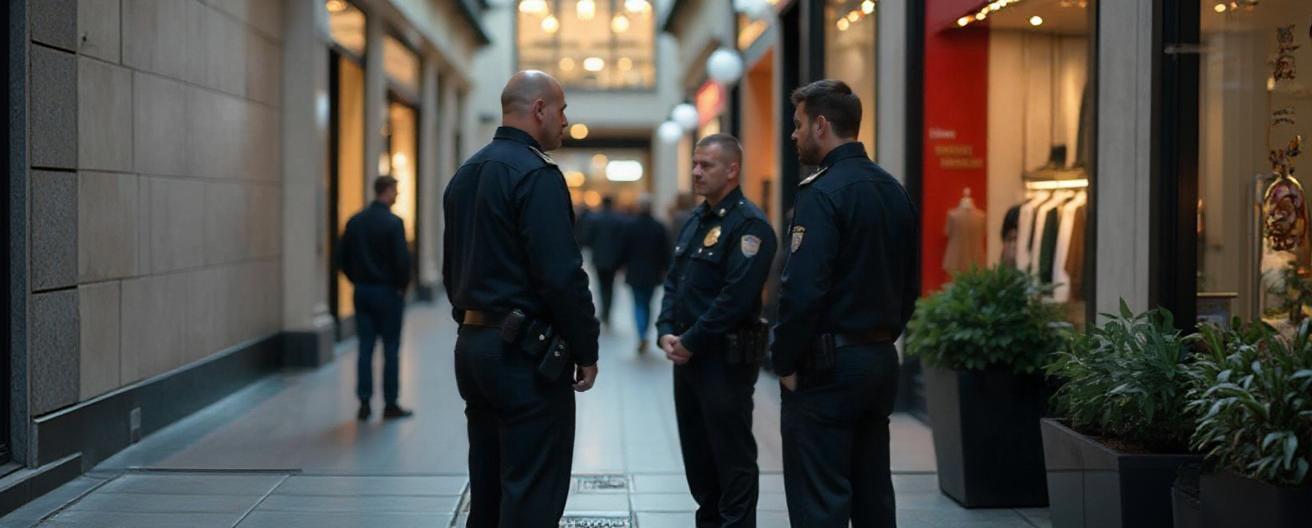Every hour, UK police record 50 retail crime offences. That’s more than one every minute, creating a relentless wave of theft, fraud, and violence. For retail security professionals on the front lines, understanding these evolving threats isn’t just about statistics—it’s about protecting the businesses and communities you serve.
When High-End Retail Becomes a Target
This week’s cyber attack on Louis Vuitton UK proves no retailer is immune. The luxury brand’s data breach represents the latest evolution in retail crime—from opportunistic shoplifting to coordinated digital operations targeting customer databases and payment systems.
For retail security workers, this shift demands new awareness. The traditional focus on preventing physical theft must expand to recognising cyber attack signs, social engineering attempts, and data harvesting operations. A suspicious individual near payment terminals might not be planning merchandise theft—they could be installing card skimming devices or accessing Wi-Fi networks.
The National Crime Agency’s arrest of four suspects aged 17-20 reveals another troubling trend: young people in sophisticated retail crime networks. These aren’t desperate individuals stealing necessities; they’re part of organised groups understanding both digital vulnerabilities and physical security weaknesses.
Real-World Retail Crime Scenarios
Consider the recent £4,000 phone shop robbery in Sevenoaks, where three suspects targeted two High Street stores in one day. This coordinated attack requires retail security professionals to think beyond individual store protection to understanding criminal patterns across retail districts.
The ongoing retail cyber attacks targeting major UK retailers, including M&S, demonstrate how criminals simultaneously exploit physical and digital vulnerabilities. A retail security professional focusing only on shoplifting prevention might miss cyber attack warning signs that could compromise thousands of customer records.
For shopping centre workers, criminals often use one store as a distraction while targeting another, or exploit complex layouts to evade detection. Understanding these tactics requires comprehensive training beyond basic door supervision skills.
The Government Response: What It Means for You
The Policing Minister’s promise for more street officers sounds reassuring, but experienced retail security professionals know reactive policing only addresses symptoms. While increased police presence may deter opportunistic crime, it won’t stop organised groups behind sophisticated retail operations.
The Home Office Safer Streets initiative creates opportunities for retail security professionals to work closely with police and local authorities. However, this requires security workers’ understanding of immediate threat response and longer-term crime prevention strategies.

Essential Skills for Modern Retail Security
The convergence of physical and cyber threats means retail security professionals must develop hybrid skill sets. Understanding CCTV operation is no longer just about monitoring shoplifters—it’s recognising suspicious behaviour indicating cyber attack preparation, social engineering attempts, or coordinated theft operations.
Modern retail security requires professionals who can:
- Identify social engineering tactics used to access staff areas or customer information
- Recognise card skimming device installation or point-of-sale tampering signs
- Understand how organised retail crime groups conduct reconnaissance
- Communicate effectively with police, management, and security personnel during incidents
- Document incidents supporting immediate response and longer-term prevention
Recent arrests demonstrate retail criminals are becoming more sophisticated, using technology and coordination requiring equally sophisticated defensive responses.
Career Opportunities in Retail Security
The current crisis creates exceptional opportunities for qualified retail security professionals. Companies like Sodexo offer £12.77 per hour for 56-hour weeks, while specialised retail security roles command higher rates. The government’s £16 million Cyber Growth Action Plan signals long-term security investment, benefiting professionals who develop relevant skills.
Success requires proper qualifications. The SIA’s licensing requirements ensure that only qualified professionals work in regulated retail security roles. With 91% of applicants satisfied with the licensing process, there’s never been a better time to pursue certification.
Additional qualifications significantly enhance career prospects. Close protection training provides skills relevant to high-end retail environments, while security guarding qualifications offer comprehensive preparation for retail security challenges.
Understanding the Broader Threat Landscape
Retail crime doesn’t occur in isolation. The Intelligence Committee’s report on Iranian threats highlights how state-sponsored actors target UK businesses, while organised crime groups exploit retail vulnerabilities for money laundering.
This means understanding that suspicious individuals might be part of larger criminal networks. The person attempting to return obviously stolen goods might be testing procedures before larger operations. Individuals asking detailed security system questions might be conducting reconnaissance for coordinated attacks.
Technology Integration and Career Development
Modern retail environments integrate multiple security technologies—CCTV systems, electronic article surveillance, access control, and point-of-sale monitoring. Retail security professionals must understand how these systems work together to become more effective at preventing crime and be more valuable to employers.
Recent cyber attacks demonstrate that criminals understand technological vulnerabilities, exploiting gaps between physical and digital security systems. Retail security professionals staying current with technological developments can anticipate and counter these tactics.
Building Your Retail Security Career
At Get Licensed, we understand retail security professionals need training addressing real-world challenges. Our SIA training courses provide comprehensive preparation for modern retail security complexities, from basic licensing to advanced threat recognition and response techniques.
Our programmes recognise that retail security work has evolved beyond traditional loss prevention to encompass cyber threat awareness, emergency response, customer service, and business continuity. We prepare professionals for careers offering immediate employment opportunities and long-term advancement potential.

The Future of Retail Security
The trends driving current demand aren’t temporary. Retail crime sophistication, cyber threat integration, and organised criminal involvement suggest sustained demand for qualified retail security professionals. Government security investment and private sector recognition of security’s business value indicate continued career opportunities.
Success requires commitment to ongoing development and recognition that your role extends beyond immediate threat prevention to creating environments where legitimate retail businesses can flourish. You’re enabling commerce, protecting communities, and contributing to economic stability.
Ready to advance your retail security career? Explore our comprehensive SIA training programmes and e-learning courses and develop the skills that set you apart in this critical industry.












